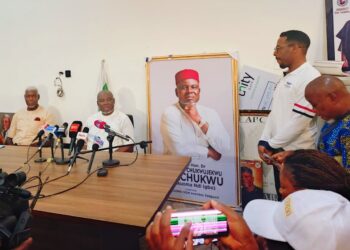As Anambra gears up for the 2025 gubernatorial election, it is becoming increasingly clear that Governor Charles Chukwuma Soludo’s strongest advantage isn’t rooted in his performance or popularity it’s in the weakness of his opponents. In other words, Soludo is lucky, not deserving.
Let’s face the truth: under Soludo’s administration, Anambra has struggled. Insecurity continues to plague communities, especially in rural areas, with little to no real action taken to combat the terror of unknown gunmen or restore public confidence in safety. Infrastructure across the state remains largely neglected, with numerous campaign promises left unfulfilled. Roads are deteriorating, public services are inefficient, and citizens are disillusioned.
Despite these failings, Soludo still stands a realistic chance of returning as governor not because he has earned it through excellence in governance, but simply because no well-known, trusted challenger has emerged to inspire the confidence of the electorate.

The All Progressives Congress (APC), for instance, has fielded candidates, but none with the credibility or grassroots trust to sway the majority of voters. While the party is strong nationally, its reputation in Anambra is tainted by poor performance, internal crises, and a lack of real connection with the people on the ground. Even the APC ticket of Prince Dr. Nicholas Ukachukwu and Senator Uche Ekwunife though arguably more energetic suffers from public skepticism and political baggage.
Other parties, including PDP and Labour Party, have not presented any widely respected or charismatic figures who could mount a serious threat to Soludo’s reelection bid. It is this vacuum of trusted leadership, not Soludo’s brilliance, that is shaping the current political landscape.
Voters are caught in a difficult position: either they re-elect a governor who has visibly failed in delivering on key governance issues, or they take a gamble on relatively unknown or untrusted challengers. This is not how democracy is supposed to work voters should be choosing between competing visions, not settling for the least disappointing option.
In a truly competitive political environment, Soludo’s chances would be slim. But in 2025, luck may be on his side not because of merit, but because of a disappointing field of opposition.
The people of Anambra are ready for accountable, visionary leadership. But until credible, trusted, and competent candidates rise to challenge the status quo, politicians like Soludo will continue to benefit not from performance, but from the failures of others.






